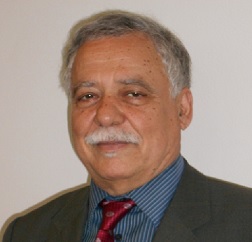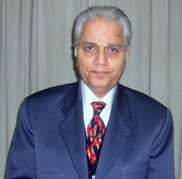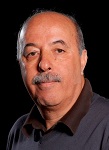Chort biography of our speakers
|
Professor
Djafer BENACHOUR
|
After graduation from the National Polytechnic School of Algiers with an Engineering degree in Petrochemistry/Polymers in June 1976, Prof. Djafer BENACHOUR went to the USA for postgraduate studies. He obtained a Master of Science (May 1980) and a Ph.D. (August 1982) degrees in Macromolecular Science, both from Case Western University, Cleveland, OHIO. Right after graduation, he joined the University of SETIF (ALGERIA) where he contributed to the opening of two programs: an Engineering degree in Polymer Engineering (October 1982). then a Magister degree in Macromolecular Science (September 1985). Currently, He is a full time professor of Polymer Science and Engineering at Ferhat ABBAS SETIF1University (Algeria). He was Rector of this university from October 1991 until August 2000. Prof. BENACHOUR has been chairing a research laboratory on "Multiphase Polymeric Materials" (LMPMP) since July 2000. He was vice-president of the Algerian Chemical Society for 15 years. Prof. BENACHOUR has been involved in chemistry education at different institutional levels for the past 35 years. He was a member of several panels on Chemistry/Chemical Engineering curricula development and updating, both at national and international levels. He supervised 32 Master and 26 Ph.D. theses over the last 25 years. He is the author/co-author of 80 international scientific publications. Prof. BENACHOUR joined the Scientific Advisory Board of the OPCW in September 2009 and served for two terms (until September 2015). He contributed to reports on "nanotechnology" and on "Education and Outreach" for the SAB final report on S&T developments (2013) prepared for the Third OPCW Review Conference. He was a member of the TWG on the "Convergence of Biology and Chemistry" (2011 - 2013) and chaired the Temporary Working Group on Education and Outreach (November 2011 - November 2014). In September 2005, he became a member of the "Committee on Ethics and Deontology" of Ferhat ABBAS SETIF1University, and was elected as Chair of such a committee in May 2015. |
|
Professor
|
Alejandra G. Suárez is professor at the Universidad Nacional de Rosario and researcher of the Consejo Nacional de Investigaciones Científicas y Técnicas of Argentina (Instituto de Química Rosario. Facultad de Ciencias Bioquímicas y Farmacéuticas, Universidad Nacional de Rosario - CONICET. Suipacha 531, S2002LRK, Rosario, Argentina.) . In June 2013 she became the Chair of the Scientific Advisory Board of the OPCW.
|
|
Professor
|
Jan Apotheker lectures in chemistry education at the University of Groningen. He is part of the team training teachers for Dutch Secondary Education, where he is responsible for the chemistry teachers. He coordinates the training program for the University Teacher Qualification at the faculty of Mathematics and Natural Sciences at the University of Groningen. He is one of the KNCV representatives at IUPAC and secretary of the Committee on Chemistry Education of IUPAC. He coordinates the European FP7-project ‘Irresistible' in which 10 University partners work together with Science centers in order to introduce the concept of Responsible Research and Innovation into Secondary Education. |
|
Professor |
Alastair Hay is Professor (Emeritus ) of Environmental Toxicology at the University of Leeds, UK. Alastair has a BSc in Chemistry and PhD in Biochemistry from London University and for most of his research career has worked on biological markers of exposure to chemicals. From 1989 to 2014 Alastair advised the UK Government and latterly the EU on limits for exposure to chemicals in the workplace. Alastair has also had a 40-year involvement with chemical weapons issues. He has conducted 6 investigations of allegations of use of chemical weapons in several countries. With a particular interest in education Alastair has worked for many years with the UK Royal Society, US National Academy of Sciences, and Organization for the Prohibition of Chemical Weapons to develop teaching material on chemical and biological weapons. He currently helps train academics and students using innovative and engaging approaches to promote the responsible conduct of science.
|
|
Professor |
Mustafa SÖZBİLİR is an professor of chemistry education at Atatürk University in Turkey. His research interests include teacher training, students' understandings of chemical ideas in thermodynamics and students' misconceptions, context- and problem/project-based learning, trends in science/chemistry education and teaching science/chemistry to visually impaired students. He have served as a titular member of IUPAC Committee on Chemistry Education (CCE) between 2008-2016 and currently chairing the committee since 2016. More information about my research could be found at http://www.mustafasozbilir.com
|
|
Professor |
Peter Mahaffy is Professor of Chemistry at the King's University in Edmonton, Canada and co-director of the King's Centre for Visualization in Science, which provides digital learning resources used by a quarter million students, educators and the public from over 100 countries each year. His current research and professional work is at the interfaces of chemistry education, visualization in science, sustainability/green chemistry, and the responsible uses of chemistry. Mahaffy recently completed six years of service as chair of the International Union of Pure & Applied Chemistry's (IUPAC) Committee on Chemistry Education (CCE), where he co-facilitated the process to obtain UN designation of 2011 as the International Year of Chemistry and served on the IYC-2011 Management Committee. He was a charter member of the International Council of Science (ICSU) Committee on Freedom and Responsibility in the Conduct of Science, and served on the temporary working group on education and outreach for the Organization for the Prohibition of Chemical Weapons (OPCW), which won the Nobel Peace Prize in 2013. He served on the American Chemical Society (ACS) presidential working group to help professional chemists communicate climate science to the public, and is co-chair of the Province of Alberta's Quality Assurance Agency for universities (Campus Alberta Quality Council). Recent awards for contributions to chemistry, chemistry education, sustainability, and public understanding of science include the Chemical Institute of Canada National Award for Chemistry Education (2003); the 3M National Teaching Fellowship (2008); the American Chemical Society James Flack Norris Award for Outstanding Achievement in the Teaching of Chemistry (2011), the ACS-CEI Award for Incorporating Sustainability into Chemistry Education (2012), the IUPAC CCE Award for Distinguished Contributions to Chemistry Education (2012), and the Dow Canada WesTEC Distinguished Speaker Award (2012). Mahaffy has over 45 refereed publications in science and science education, and presented 80 plenary, keynote or invited lectures and numerous workshops to scientists, educators, and the public on six continents in the past six years. |
|
Professor |
Engida Temechegn has been an instructor in the Faculty of Education of Addis Ababa University (AAU, Ethiopia), teaching both undergraduate and postgraduate (MA and PhD) students of chemistry education as well as researching and advising research works through face-to-face and distance modes. He was the first Associate Dean for Research and Postgraduate Programs of the Faculty of Education in the AAU. He has also been lecturing in Bahir Dar University and Haromaya University (both in Ethiopia) and co-advising PhD students of chemistry education in the University of South Africa (UNISA). He served as the founding President of the Federation of African Societies of Chemistry (2006-2013) and is serving as Editor-in-Chief of the African Journal of Chemical Education. He is also the Chairperson of the provisional Committee on Chemistry Education in Africa (CCEA) that is the responsible body of FASC for ACRICE. Dr. Temechegn currently works for the UNESCO International Institute for Capacity Building in Africa (IICBA). |
|
Professor Ameen Fahmy |
Ameen Fahmy was appointed as professor of organic chemistry at Ain Shams University (ASU, Cairo, Egypt) in 1979, and as professor emeritus since 2003 to date. He supervised about 60 M.Sc & PhD students in organic chemistry. In 1976 he was appointed as a chemistry expert in the Science Education Centre (SEC) of ASU and in 2000-2003 he was the director of SEC. In 1998 Ameen Fahmy and Professor J.J.Lagowski, started a collaboration between ASU and the University of Texas in Austin (USA) on an innovative method for teaching and learning which they called the Systemic Approach to Teaching and Learning (SATL) website;www.satlcentral.com. He has about 150 publications in his two areas of expertise, Chemistry and Chemistry Education. He serves as a member of different international, American, European and African Societies, Committees and Associations. He was invited as PL/keynote speaker in different international, Arab, African conferences. He organized about 90 International, National, Arab Conferences, Workshops, Seminars, and training programs on SATL applications, Systemic Assessment and TQ-programs in Education. He also acts as a visiting Professor in different European, American, African and Arab Universities & as president of 15th ICCE [Cairo,Aug.1998]. |
|
Professor |
Mustapha AIT ALI is full professor at the University Cadi Ayad in Marrakech. He is working in Organic Chemistry, Organometallic Chemistry and catalysis in the Department of Chemistry, Faculty of Sciences Semlalia, Marrakech-Morocco. His research interests include Coordination Chemistry, asymmetric Catalysis, Green chemistry and nanoparticles and the chemistry of nanostructured materials: graphene; silicene and phosphorene. Pr. M. AIT ALI was a guest professor at Faculté de Technologie Université Ferhat Abbas Sétif-1 Algérie, Villeneuve d'Ascq University France, ENS Chimie de Rennes France and at the University of Cergy Pontoise France. He co-authored more than 60 papers published in leading refereed journals. He participated at more than 70 congress and supervised 10 PhD students. He also participated in 10 international cooperation projects and he was an active member in the organization of several international conferences |
|
PHD
Rohan P. Perera
|
Dr. Rohan P Perera graduated from the University of Colombo with a First Class Honours in Chemistry in 1995. He obtained a MS and PhD in Chemistry focused on neurochemical basis for Parkinson's disease from the Wichita State University, Kansas, USA. Dr. Perera is a Fulbright Scholar and received the European Union Erasmus Mundus Expert Asia scholarship and served as a visiting scholar at the Department of Technical Medicine, University of Twente, The Netherlands. He has over 15 international publications and more than 30 abstracts. He has presented several papers on Chemical Safety and Security Risk Assessments and Chemical Threat Reduction in International forums. He has written four books, while one focuses on Chemical safety and Security on Hazardous Chemical Management. Presently he works as a Senior International Cooperation Officer, at the Organisation for Prohibition of Chemical Weapons in The Hague, The Netherlands |
|
Professor Farouk TEDJAR |
Academic Background 2. Doctor Engineer in Electrochemistry, Polytechnic Institute of Grenoble 3. PhD in Physical Chemistry from Scientific University of Grenoble. Professional background ·Engineer in Battery industry as technical manager in Public Complex of alkaline and lead acid battery production (5 years in Setif-Algeria). · Joins University of Setif (Algeria ) in 1981 as successively Chief of Chemical Department, Founder and Director of Chemical Institute, Vice Rector of R&D and Director of first R&D unit in Electrochemistry. · In 1992 moved to Grenoble (France) as associate professor at Polytechnic Institute. · During his work at the University of Grenoble he founded RECUPYL after incubation into Polytechnic Institute of Grenoble (and 20 years acting as President). The process was disseminated in 6 countries Prof. Tedjar was also :
Prizes and awards Prof Tedjar received 6 innovation prizes and award including: 1. First Technology Prize of French Chemical Society in 2000 for clean electrochemistry 2. First Prize of Clean Technology, French Environment Ministry December 2007, 3. Second Prize of Marius LAVET, best innovative engineer of the Year 2007, 4. Medal POTIER for lithium process French Minister of Industry (July 2008) 5. Medal of the best Technology Teacher coming from Industry 2014 6. Award from European Patent Office 2012. |
|
Professor 
|
Liliana Mammino got a degree in chemistry from the University of Pisa (Italy, her home country) and a PhD in chemistry from Moscow State University (Russia). Her earlier work experience includes chemistry teaching at the National University of Somalia (1974-75), University of Zambia (1988-1992), and National University of Lesotho (1993-1996). Since 1997, she has worked at the University of Venda (South Africa), where she established computational chemistry research and where she is currently a professor emeritus. Her research interests comprise theoretical chemistry (her field of specialization), with main focus on the computational study of biologically active molecules, and chemical education, with particular attention to conceptual understanding and to the roles of language and visualization. She has published extensively in both these areas. She is a member of the IUPAC Subcommittee on Green Chemistry. In 2013, she was one of the recipients of the IUPAC Award for Distinguished Women in Chemistry and Chemical Engineering |
https://laboratoires.univ-setif.dz/L.P.M.A.M.P.M/











